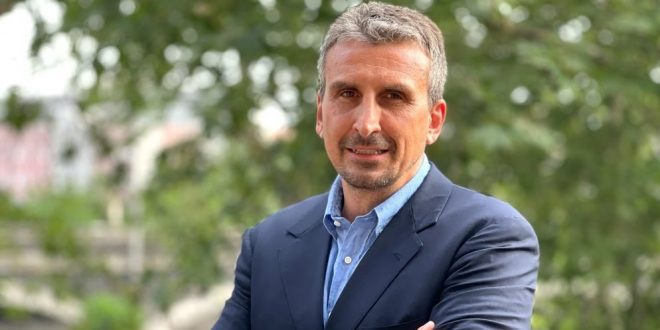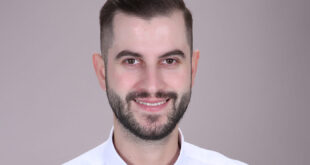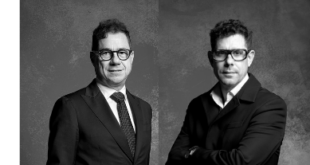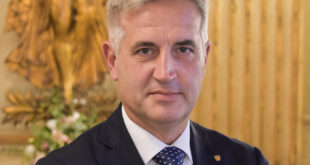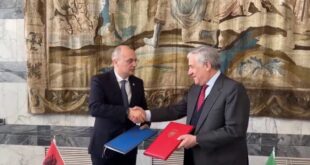Welcome to our magazine, where we explore the exciting world of business and economics through the lens of successful entrepreneurs like Luca Busi. As one of the first investors in Green Mobility in Europe, His Group is not only at the forefront of innovation but also deeply committed to sustainability and environmental protection. In this issue, we have the privilege of hearing from Busi about his motivations, challenges, and experiences in both Italy and Albania, including the historic moment of bringing the FIFA World Cup to Albania for the first time. Busi’s journey is a testament to the power of hard work and the potential of entrepreneurship to create positive change. We hope you enjoy learning from Busi’s insights and wisdom as much as we have.
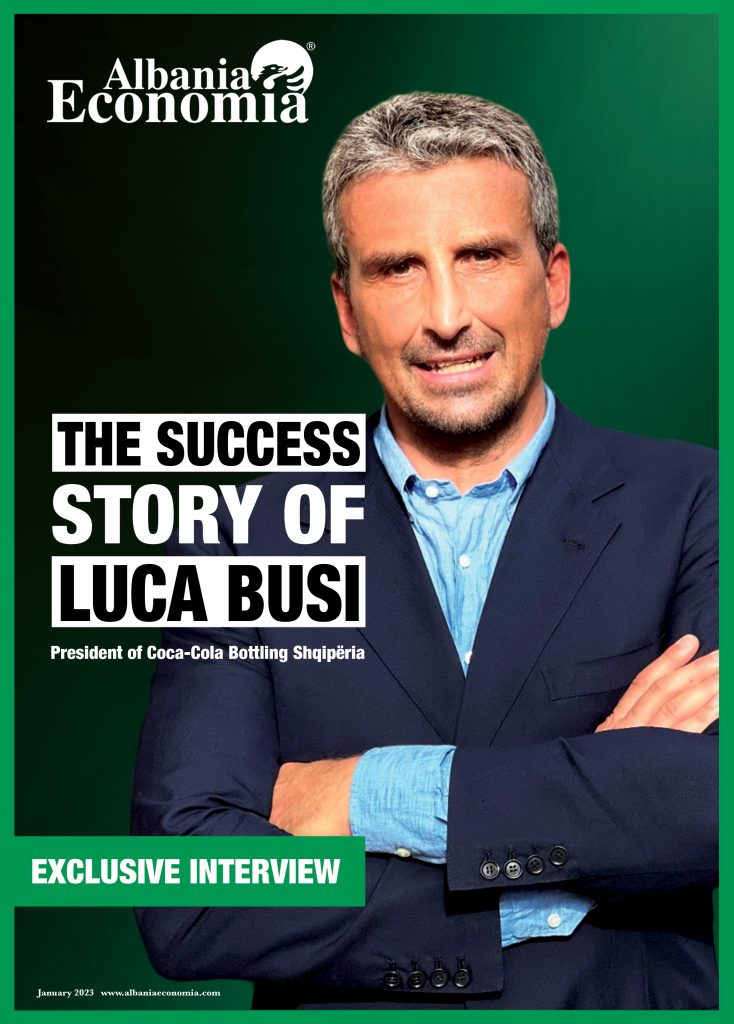 Before we start, can you tell us more about Luca Busi …
Before we start, can you tell us more about Luca Busi …
Luca Busi is an entrepreneur who has come to be what he is now after many years of hard work. I started to work when I was 15 years old, in Bologna, making hamburgers at Cremonini. My working journey started in the field, getting my hands dirty and working for 11-12 hours a day made me understand the value of commitment. Upon completion of my University studies, I officially became part of the company and when I turned 30 I was ready to become part of Coca-Cola Sicily, where I was about to lead one of the most important stages our Group was in: the restructuring of Sibeg, the most important company which from 1960 and on continues to manufacture, bottle and develop all the ‘The Coca-Cola Company’ brand products in Sicily. In 1991 Maria Cristina Elmi Busi was appointed as Executive Director and after 10 years, time came for this exchange of generations and I took over the management of the company. I performed the tasks with the same energy as my mother did and with a bunch of ideas in mind to put them in practice in the further management of the company. Apart from my work I also do sports, from basketball to alpine skiing and mountain biking. I like speed, movement and strength that comes out of balance control, in particular related to work.
During your career have you had any startup experience? Can you talk about that?
Yes, certainly. When I was young (28 years of age), I founded and managed a startup named “Spesa Sicilia”. Together with some other partners, we had established the first online supermarket in the island, at a time when the web was still an unexplored ground. That was an experience that taught me a lot about the courage and the risk involved in entrepreneurship. The second experience with the startups was in 1992 when the adventure with the Coca-Cola Bottling Albania started. Those were very intensive years with plenty of market analysis, feasibility studies, business plans, market strategies for the Company in order to prepare the ground for the first international important investment in Albania, a country that had undergone a 25-year communist dictatorship. It was an investment that started from the greenfield site; two years were needed for the establishment of the company, arrangement of the legal part, the logistic and organizational part leading to the construction of the factory. In 1994 CCBS took its first steps in the streets of Tirana, to bring more values to a unique country where intelligence, liveliness and resilience feature strongly. When I go back to the first production batch, the first receipt, the first delivery, the first cashed payment, emotions run high.
Would you invest in a startup again?
The startup world has always fascinated me. I have been trying to give my contribution in this sector as well, by becoming part of the Sicilian Venture Philanthropy Foundation, a reality that promotes networking, innovation and social change via scouting and offering support to the young people who aspire to become entrepreneurs. The principles we always abide by are “Good Economy” and sustainability, in an endeavor to explore the magnificent qualities of the Sicilian territory. The Startups that decide to join and become part of the SVPF reality are in fact very determined to grow and have a strong will to represent the qualities of the area. These are realities in possession of a great desire to achieve success and that are willing to work toward this objective, committed to cooperation, to the social aspect, and to the principles of a successful entrepreneurship. I continuously observe the young people in order to find new opportunities for investments and to be constantly in search of new impulses; you never stop learning, even from the young generation.
Have you ever worked in a SME? If yes, what was your experience compared to working in a large company as SIBEG-CCBS?
Our group is represented by five companies that started from scratch, building the company infrastructure first, then in a process of growth and strengthening during the company activities. Our realities have always been small and oriented towards a consolidated journey and thanks to the qualities we possess: speed of action, agility and resilience, our teams have always made the difference. Currently, Sibeg and CCBS are companies that, referring to their turnover, are listed in more important positions in the respective market; Tepelene and Tomarchio are currently in that development stage and in the medium term they shall become stronger. Today, the Group states a 215 mln turnover and counts 900 workers with a percentage Ebit over the turnover equal to 9%: our strength rests in the ability to create a team by keeping alive the identity of every company. Everything comes around speed of action and resilience.
How is this sector affected by the social networks and by the “influencers’ culture”?
The social media is a substantial tool in establishing the reputation of the company; Coca Cola is on the front line in Italy; Sibat Tomarchio is approaching this line by investing in the digital aspect and outreaching the main influencers of Sicily; we are working with Tepelene and CCBS in this direction through studying and monitoring the territorial digital context. The industry may have only a positive impact on the network but what is crucial is to enter the world of social media in a healthy way, by promoting excellent and qualitative products in an ethically correct way making our green world emerge.
Which has been the most serious challenge you have ever faced?
The biggest challenge is always the one we have not faced yet. In the future we aim at reaching the “Carbon neutral and Zero Emission” target; Sibeg Coca-Cola has this target set for 2026, whereas CCBS for 2030. It is a large undertaking to become applicable in a very short time, an achievement that shall set national and international records. Regarding the past, the most significant goal was the restructuring of Sibeg when I was only 30 years old, I managed to create a super group by opening 30 working yards simultaneously and managing to close them within the set deadlines. It was a race against time, working restlessly and nonstop on Saturdays and Sundays and feeling breathless. Five years were needed to find the resources, making the financial arrangements and rapidly start the development of a reality that today is known as Sibeg Coca-Cola and that evidence shows that it is a reality that makes the difference.
How would you describe your leadership style?
One side of my leadership style is definitely a dictatorial one; I work instinctively, driven by passion, but when strategical decisions need to be taken I activate muscles and brain. On the other hand, having also cooperative leadership style, I like to involve the group, I share with them the difficulties, we solve our problems together and cooperate in finding the right solutions in due time.
Which is the most important quality a leader should have? Why?
Leadership is the only word that is used in Italian to translate the Latin word “ducere”, meaning to lead, to guide, to command. I believe priority should be given to attaining the right mix of authoritarian management and interpersonal management, being decisive and based on respect and trust.
 Where do you see this sector in 10 years time?
Where do you see this sector in 10 years time?
Our Group and the food & beverage market in general – is going more and more toward a green direction, with the purpose of offering consumers very healthy products at a “zero emission” rate. We are oriented toward the environmental policy as a result of different commitments we have undertaken in the manufacturing activity and factories’ management. We believe that the preservation of the protection of the environmental values, the social responsibility and the creation of wealth for the entire community are an obligation to be fulfilled.
You are one of the first investors of Green Mobility in Europe. Can you say more on this regard?
Arguments as the sustainable environmental development, as mentioned above, are at the core of our companies. Minimizing the impact, for us is not simply an objective, but most of all is a commitment we have undertaken by establishing an integrated management system. The conversion of the company cars to electric power has been one of the most important actions performed during these years in Sicily and in Albania. “Green Mobility Project” marks a revolution for the mobility mode of the company and constitutes an infrastructure resource that has enabled the construction of a new “Electric Ecosystem”, via a pilot project that has become an example to many other companies.
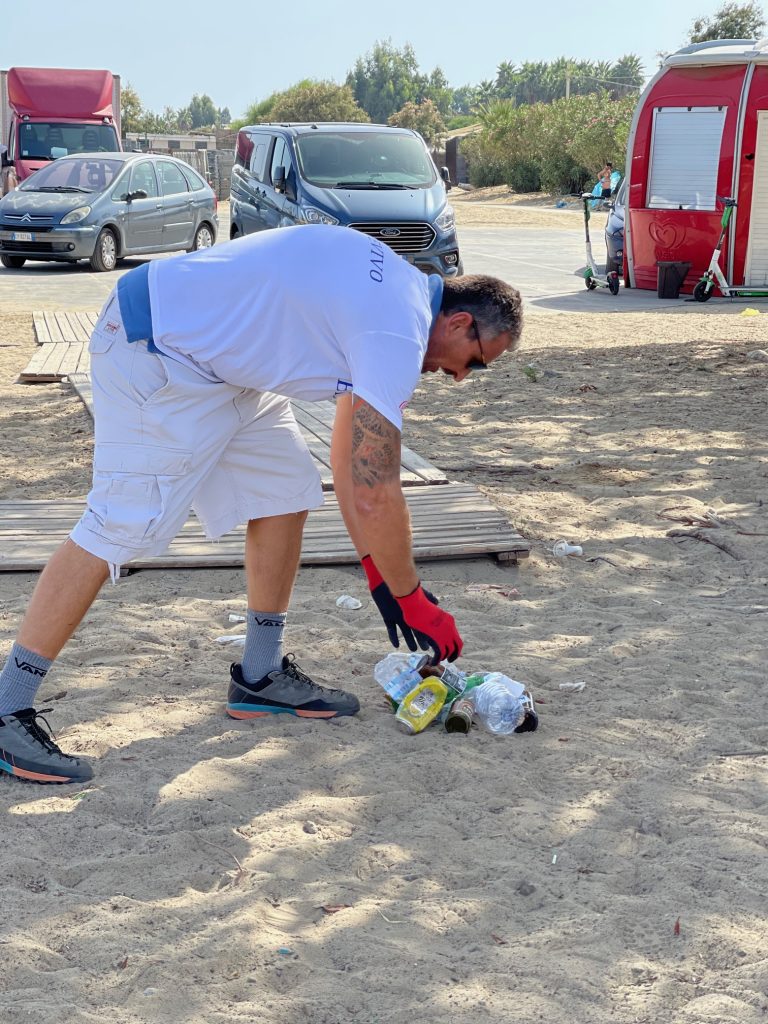 Your Group is engaged in environmental projects both in Italy and in Albania. Can you tell a little more about it?
Your Group is engaged in environmental projects both in Italy and in Albania. Can you tell a little more about it?
«For our Group, environmental related issues have always been a priority – underlines Busi – both in Sicily and in Albania we have been pioneers in building a virtuous business model from which the whole territory has benefited, thanks to many and diversified actions on the sustainability front. With the “Green Mobility Project”, both in Sibeg and in CCBS, in a noticeably brief time, we did implement a total transformation of the fleet vehicles, which became 100% electric. Although with different methods and timing, we have always aimed at overly ambitious objectives: from the implementation of photovoltaics for the self-production of clean energy – with continuous investments and expansions both in Sicily and in Albania – to the virtuous management of waste and cultural aspects through raising awareness – starting right from the schools, creating innovation of primary and secondary packs – through responsible bottles made of rPet (100% recycled plastic) – and ending with the engagement of different Group teams, cleaning of public coasts, municipal parks and areas near the establishments (this year the Sibeg team with Marevivo collected over 2.5 tons of waste). Among the actions in progress, the construction in Sibeg of a new trigeneration plant fueled by green hydrogen and biomethane; the construction in CCBS of a second photovoltaic plant and – based on the results achieved – the possible construction of a trigeneration plant; the replacement of all the latest generation low-energy-consumption refrigerators and the efficiency of all production lines.
Upcoming challenges?
For us at Sibeg Coca-Cola and CCBS, the numbers – in addition to the kilometers of coasts cleaned, the carbon dioxide emissions saved, the percentages of rPET sorted on the markets, which are confirmed as in “black and white” Sustainability certified documents – are linked to two very important dates, which will radically revolutionize our realities: “2026” for Italy and “2030” for Tirana. It is that the real entrepreneurial bet for our Group: to become zero emissions and “Carbon Neutral” in a planned timeframe and with a clear fixed road map that will truly allow us to become pioneers. An avant-garde corporate vision that I hope, and I am certain, will be able to inspire and drive many SMEs. This is our greatest ethical commitment with consumers. These numbers have already been imprinted in our planning for years: we have been working under pressure and with a lot of commitment, for a race against time that will allow us to flex our muscles and show how much and with what agility we move to achieve truly incredible performances”.
For the first time in Albania you brought the FIFA World Cup. What were the emotions it evoked to the country?
It was a highly emotional experience, for the institutions, for the football fans, for the citizens and for the children. Thus, it was a strong emotion for the entire 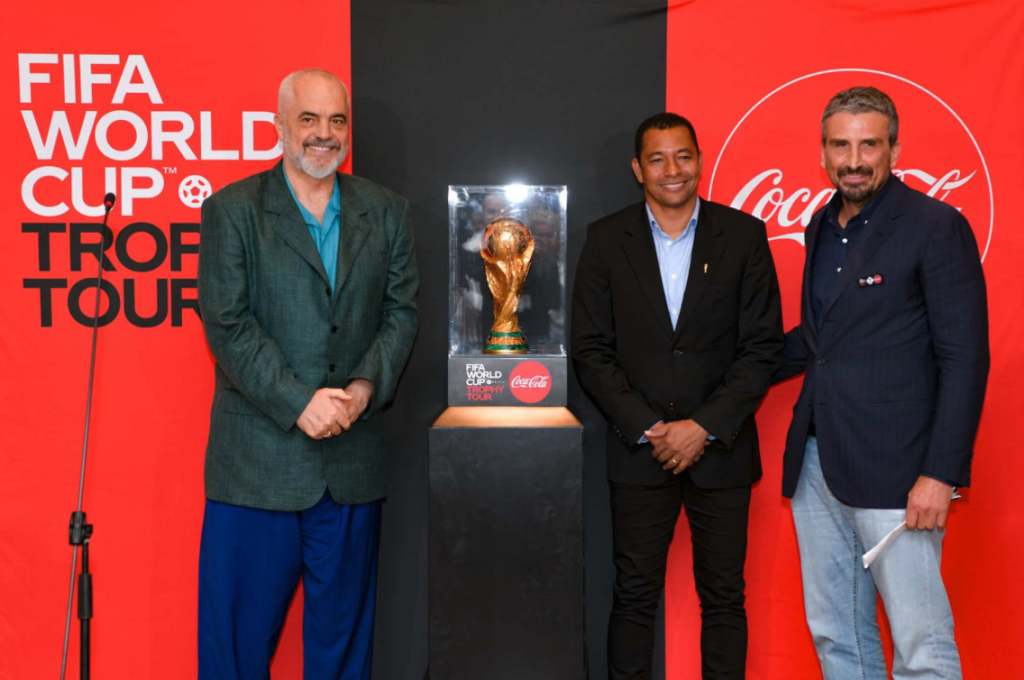 country. Looking at the eyes of the teenagers radiating joy was like a dream come true. Time has come for another wonderful dream, we have to make all efforts to qualify for the world championship so that we can see thousands of eagles flying over the stadium stands, livening up the wonderful Albanian fandom.
country. Looking at the eyes of the teenagers radiating joy was like a dream come true. Time has come for another wonderful dream, we have to make all efforts to qualify for the world championship so that we can see thousands of eagles flying over the stadium stands, livening up the wonderful Albanian fandom.
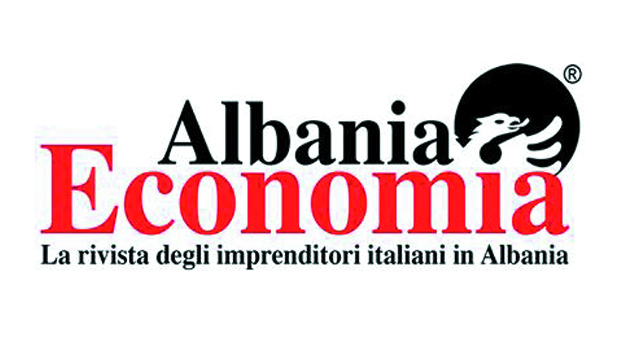 Albania Economia
Albania Economia
